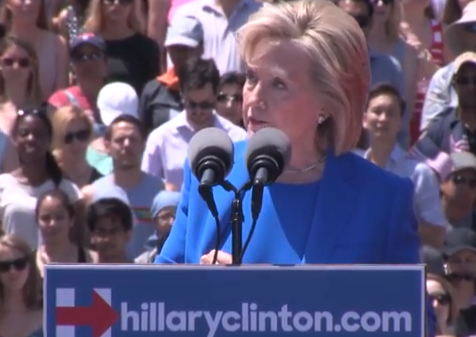Typical of presidential campaign announcements, Hillary Clinton’s kick-off speech on Saturday was a call to action that wasn’t as forceful as it first sounded. When running for executive office, you first describe public-policy goals (“Let’s make college affordable and available to all”) to make them seem so obvious, so bipartisan and so ecumenical, that they can be achieved without nasty political fights.
“I’ll always seek common ground with friend and opponent alike,” Clinton told a crowd in the almost unanimously Democratic city of New York—where she took a moment to point out the United Nations headquarters, a hated symbol for so many Republicans. “But I’ll also stand my ground when I must.”
It remained unclear what would trigger “standing my ground,” though she can hardly be expected to specify when she’d use her veto pen when she wouldn’t take office for another year and a half. But by historical standards, the Democratic Party has a short list of non-negotiables (no more Equal Rights Amendment, full employment act or plan to eradicate homelessness), and the first President Clinton has a lot to do with that.
Before Bill Clinton’s presidency, one would have been startled by the paltry references to organized labor in Hillary’s speech. The highest praise she gave what was once a crucial bloc in the Democratic constituency: “There are union leaders who are investing their own pension funds in putting people to work to build tomorrow’s economy. We need everyone to come to the table and work with us.”
Nothing about the potential of organized labor as a tool to achieve some of her top goals, including an increase to the minimum wage, pay equity for women, paid family leave or humane work schedules. Nothing about a counter-attack to states curbing the power of unions to organize and negotiate for workers, even though one of the leading contenders for the Republican nomination, Scott Walker, made his name by busting public-sector unions in Wisconsin. Instead, Hillary Clinton characterized union leaders as part of the investor class, in keeping with the no-class-warfare ethos of the first Clinton administration.
Hillary told the New York crowd that she backed a constitutional amendment overturning the Citizens United Supreme Court decision that lifted restrictions on campaign spending by corporations and unions. She also said, “I’ve proposed universal, automatic registration and expanded early voting” but said nothing about how to change the current system of states constantly changing their idiosyncratic laws about voter eligibility and registration requirements. That would require a constitutional amendment, or at least some kind of federal law with financial incentives for states to adopt uniform standards (kind of like how we got a national drinking age of 21). But in the wake of the Affordable Care Act, one can easily imagine half the states giving up millions of dollars in federal aid by refusing to implement same-day voter registration. No, Bill Clinton’s declaration that “the era of big government is over” is still in effect when it comes to major national initiatives, especially if Hillary doesn’t have a Democratic majority in Congress.
On Saturday, Hillary Clinton praised her husband for “a balanced budget” during his presidential administration. She attacked the “trickle down” economics of the George W. Bush administration, saying, “instead of a balanced budget with surpluses that could have eventually paid off our national debt, the Republicans twice cut taxes for the wealthiest [and] borrowed money from other countries to pay for two wars.”
Even Franklin D. Roosevelt talked about the godliness of balancing budgets, but Bill Clinton actually did it. His grand strategy was to change the public perception of the Democrats from tax-and-spenders to the kind of fiscally responsible party that upper-class suburbanites could vote for and Wall Street executives could contribute to. The strategy apparently paid off in boosting consumer and investor confidence in the 1990s. Its political effectiveness is harder to judge; Bill Clinton mostly seems to have flipped things so that the Democrats became the stronger party at the presidential level and the Republicans became the stronger party at the congressional level.
The balanced-budget strategy’s effect on public policy was compatible with the “end of big government” claim. As Hillary pointed out, the next president, George W. Bush, promptly used the budget surpluses to justify tax cuts—which then caused federal deficits that could be used to justify cutting government services. (The economic crisis of 2008 led to the election of Obama and a Democratic Congress, but that was only a temporary window for new government initiatives, through which Obama pushed the Affordable Care Act with not an inch to spare.)
One big mystery about Hillary Clinton remains whether she would follow in Bill’s footsteps and seek the editorial-page glory of balanced budgets, producing surpluses that the next president (maybe another Bush, or a next-generation Romney) could use to cut taxes again. If so, what will happen to improving public schools, reducing student debt, coming up with drug-treatment programs and other alternatives to incarceration, and making “preschool and quality childcare available to every child in America”? Would any of that get through a Republican-controlled Congress anyway?
Besides the stingy references to labor unions, the sparse mentions of religion and spirituality in Clinton’s speech might have puzzled someone from the FDR and JFK eras of the Democratic Party. (She did end with the obligatory “God bless America.”) But Hillary’s address was ultimately more of a Sunday sermon than a political agenda, with appeals for Americans to treat each other more humanely and fairly. (“Prosperity can’t be just for CEOs and hedge fund managers.”) Over the next year, we’ll find out whether the ground she stands on is appreciably different than that of the first Clinton administration.








